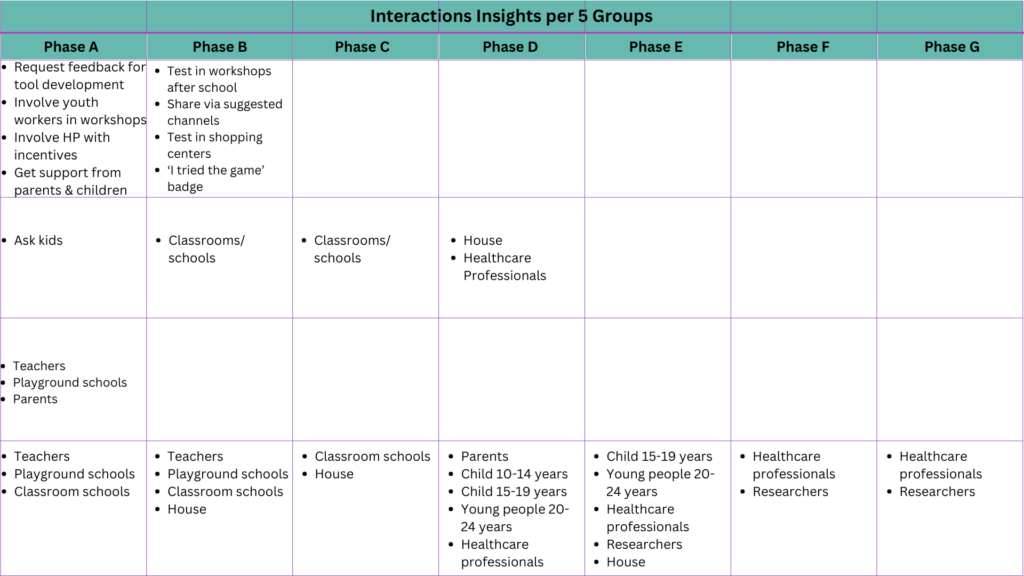Insights from Stakeholders: Co-Creating the SMILE Tools (surveys results)
How Stakeholder Feedback Shaped SMILE Tools
In SMILE, listening has been at the heart of innovation. Let’s discover how stakeholder feedback helped shape our tools and methods.
From the very beginning, SMILE has been built on one guiding principle: listening matters. Between July 2023 and January 2025, our partners carried out 13 surveys, engaging youth, families, teachers, mental health professionals, internal partners, and international participants to better understand real needs, expectations, and perceptions of mental health in young people.
Through these surveys and participatory exchanges, over 250 voices contributed to shaping the tools and values that make SMILE unique. Their feedback guided our design choices, usability priorities, and the human-centered approach driving SMILE’s digital mental health ecosystem.
These insights continue to shape how SMILE’s digital tools are designed, tested, and refined across Europe; ensuring they remain inclusive, evidence-based, and truly meaningful for young people.
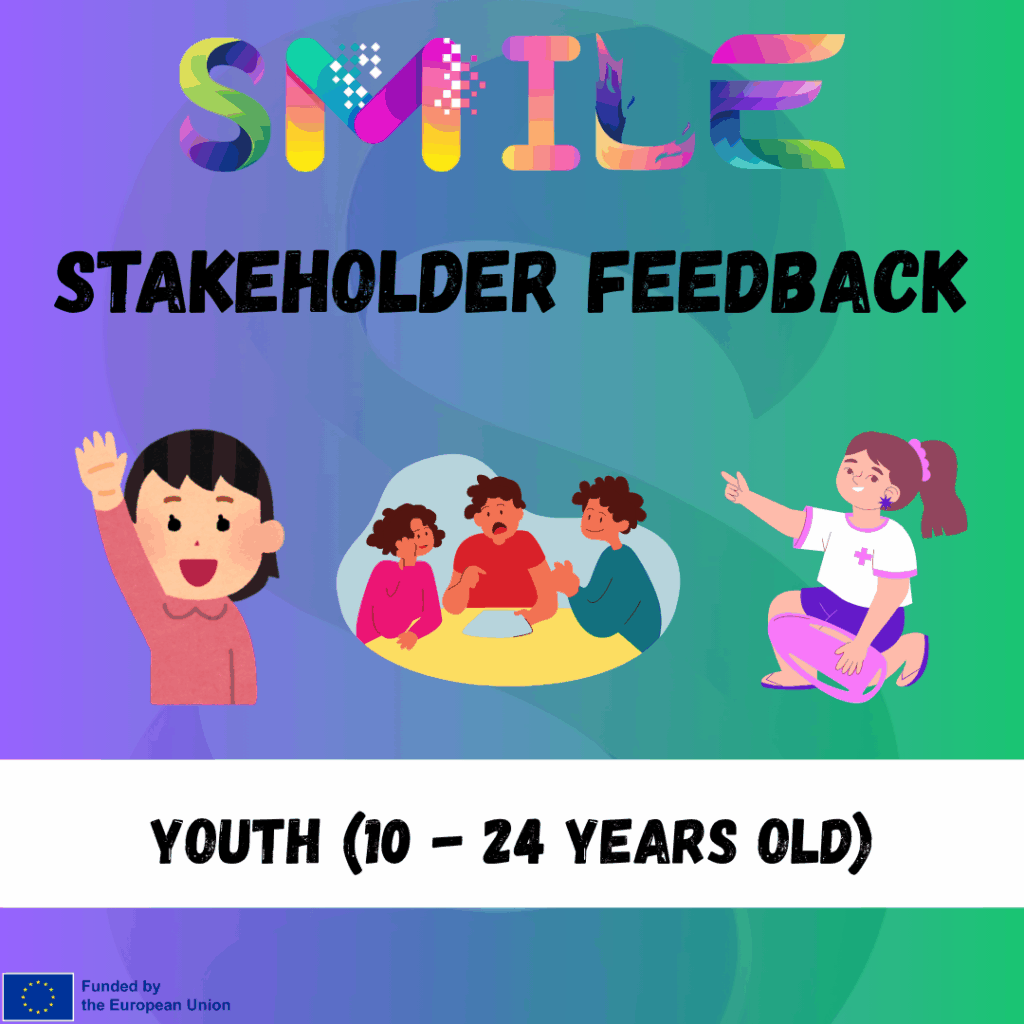
Youth (10–24 years old): Mental Health in Their Own Words
Young people told us their biggest stressors are uncertainty about the future, academic pressure, and feeling misunderstood by adults.
They mainly talk about mental health with friends, rarely with parents or teachers, showing a need for safe spaces where conversations feel natural and stigma-free.
When it comes to digital tools, youth appreciate accessibility and innovation, but they also worry about screen addiction, lack of human connection, and privacy. Nearly half said they would try the SMILE app and game, as long as it’s safe, affordable, and visually engaging.
Parents & Families: Balancing Caution and Curiosity
Parents identified anxiety, eating disorders, and social isolation as key concerns for youth.
They view digital tools with cautious optimism: they must be simple, privacy-protected, and clinically validated to earn trust.
About half of parents expressed willingness to use SMILE tools with their children, while others raised concerns about excessive screen time, reinforcing our goal to create tools that support rather than replace family connection.
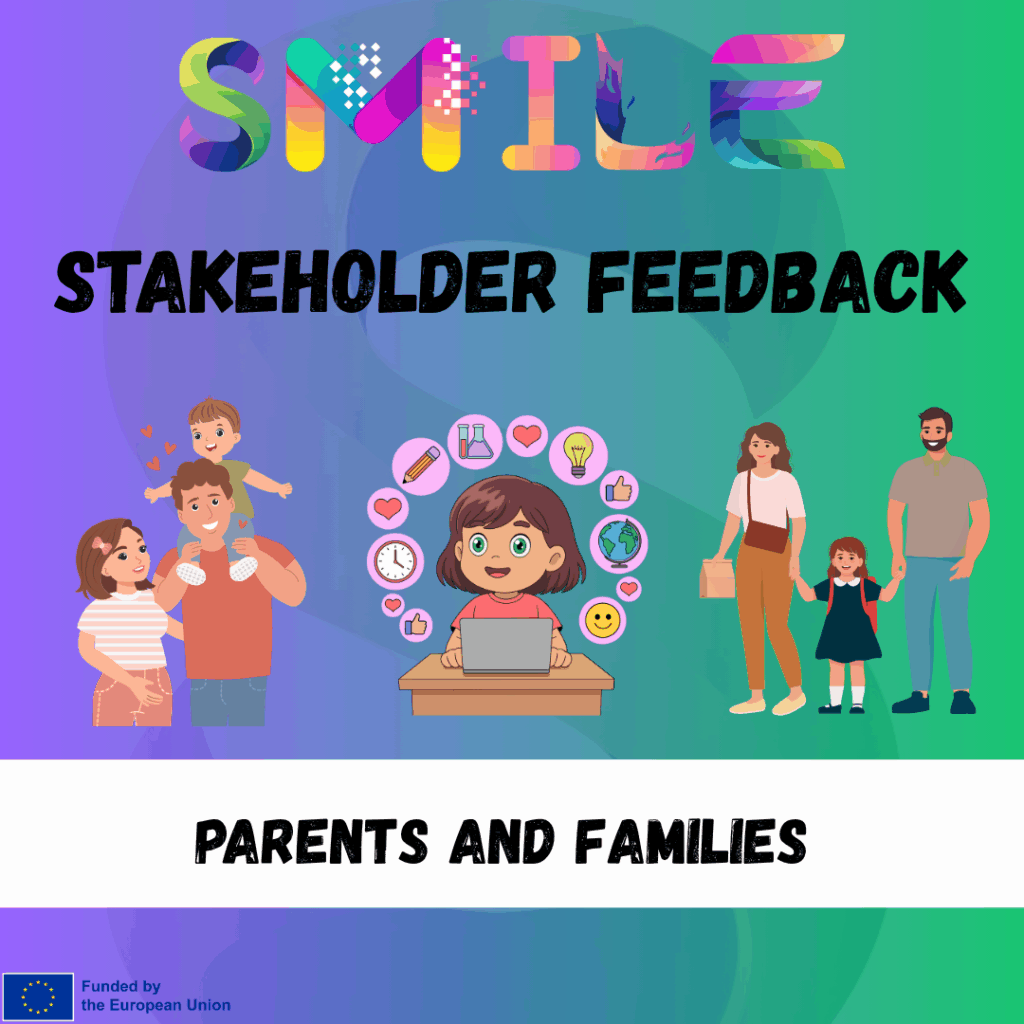
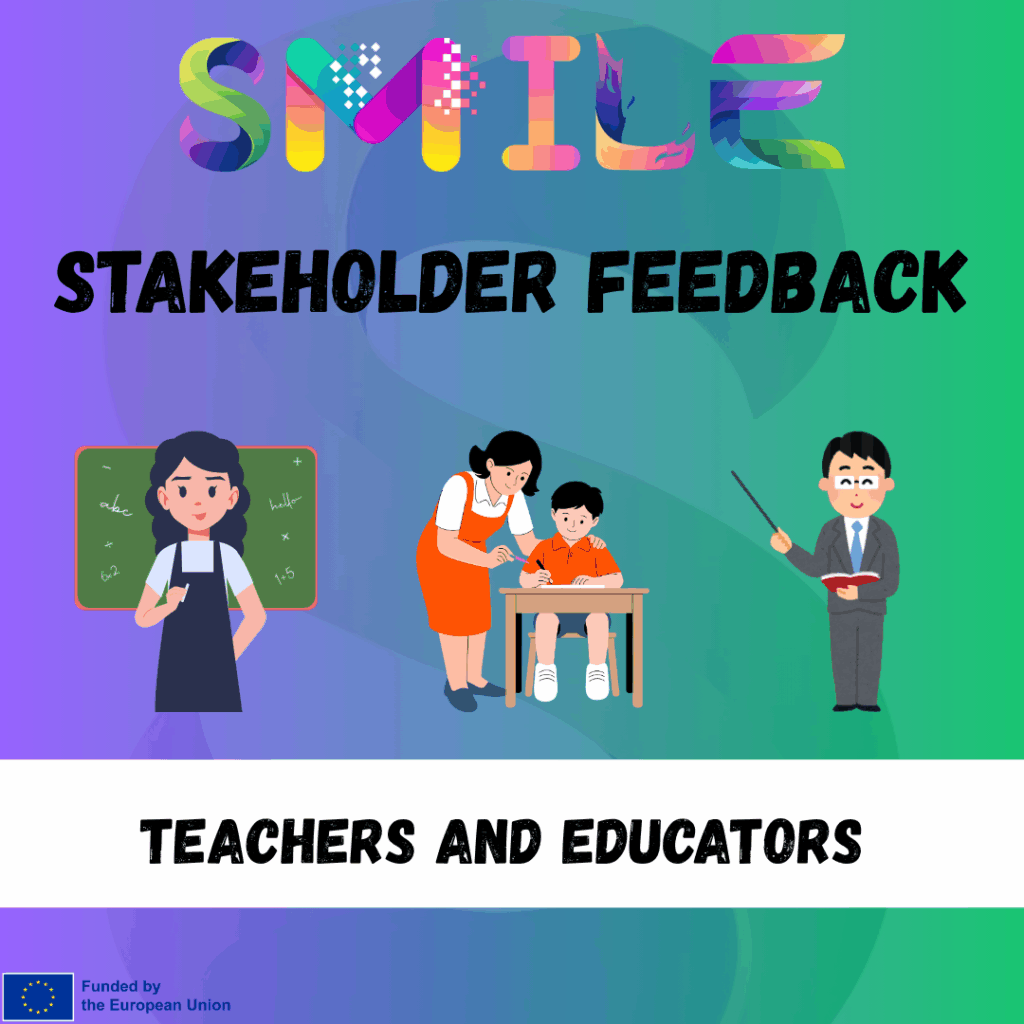
Teachers & Educators: The Classroom as a Safe Space
Educators across Europe confirmed that mental health education should be part of the school curriculum, adapted to different ages and contexts. They reported that discussing mental health is generally accepted within schools, but in some countries, especially in the Mediterranean area, it remains a sensitive topic at the societal level. Teachers proposed key actions:
- Introduce psychoeducation for students.
- Provide training for teachers on youth mental health.
- Integrate mental health topics into school programs.
They see digital tools as useful for education, when complemented by human interaction. The features teachers value most: cost-effectiveness, appealing graphics, strong privacy protections, and adaptability for students with special needs. Teachers recognise that digital tools can help, but they must be inclusive, practical, and human-centered to truly support student well-being.
Mental Health Professionals: Bridging Science and Digital Innovation
Professionals working with young people identified anxiety and bullying as the most frequent challenges.
They see digital solutions as valuable complements to therapy, not substitutes, and emphasised the need for affordable, secure, and customisable tools.
Their feedback guides how SMILE integrates evidence-based methods into digital design, ensuring our tools are not only engaging but psychologically sound and clinically relevant.
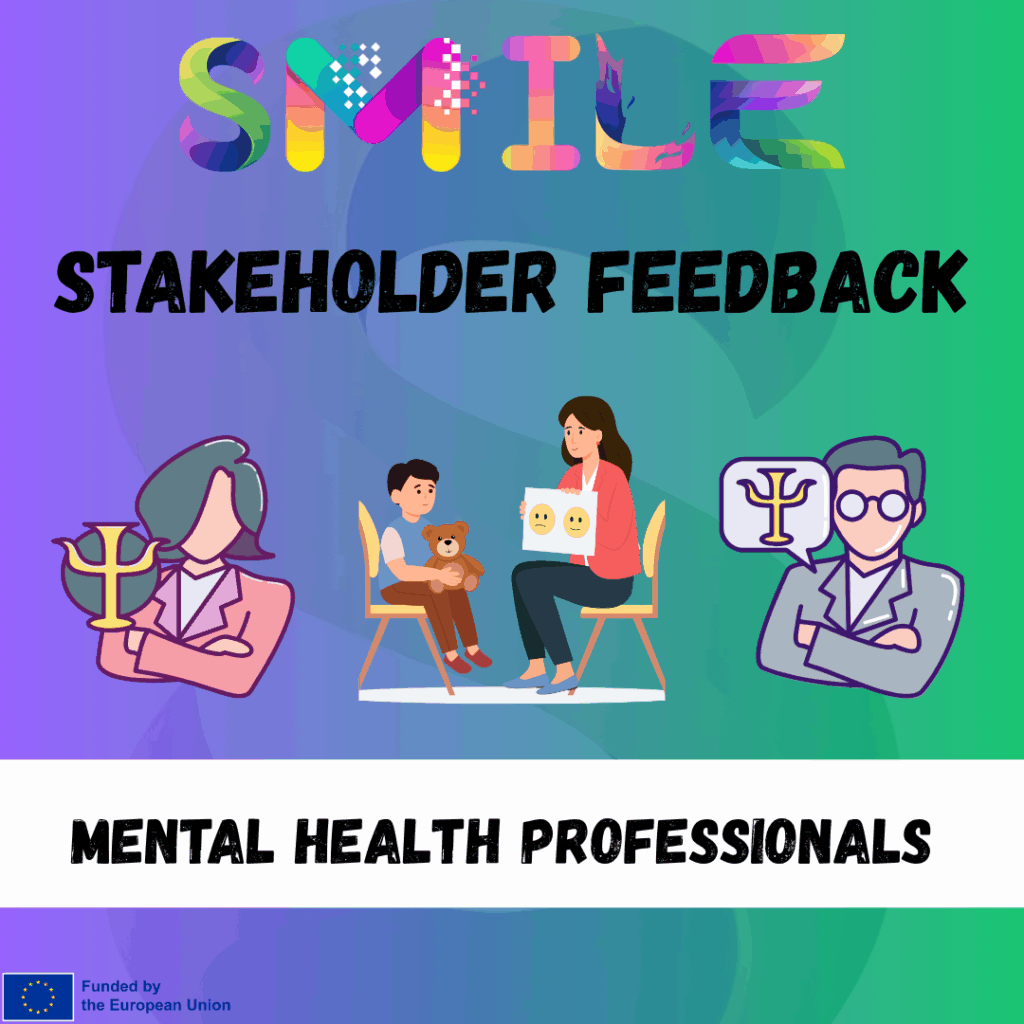
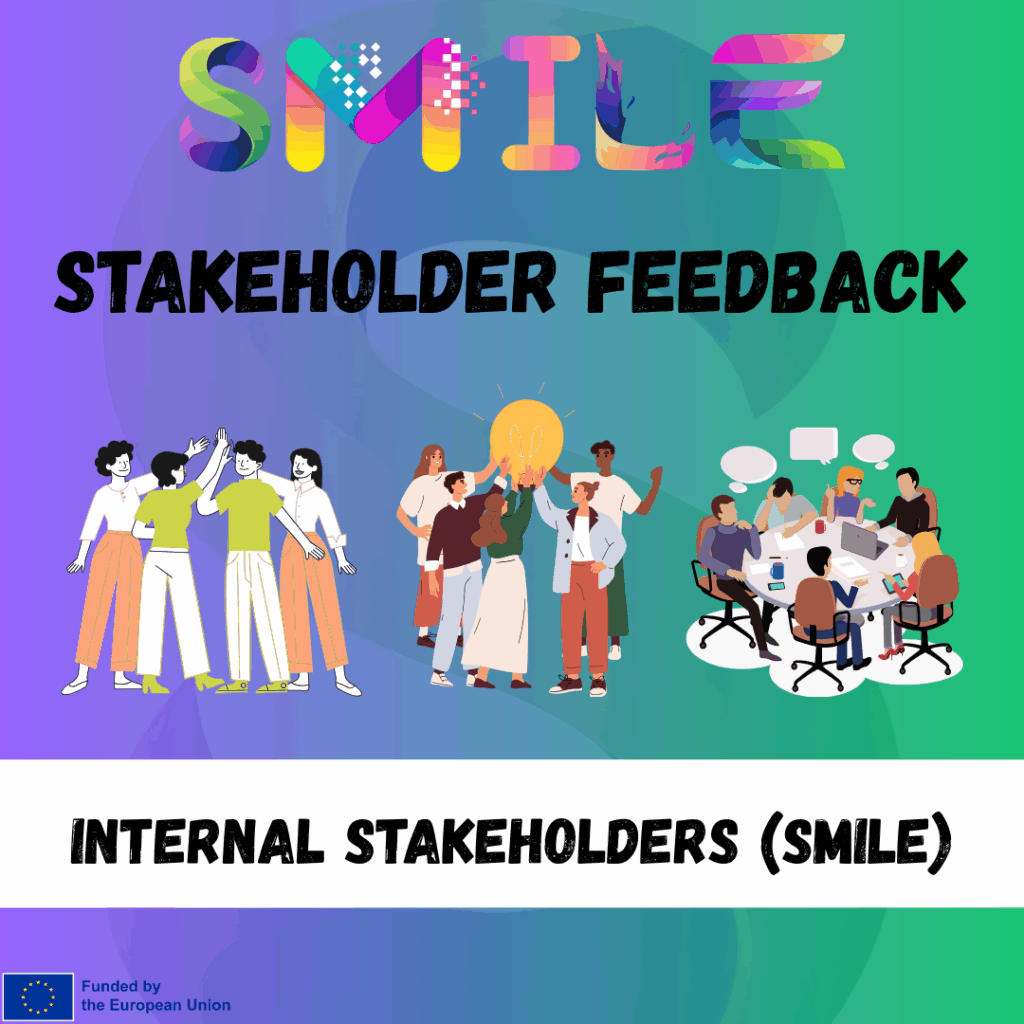
Internal Stakeholders: Co-Creation in Motion
Consortium partners offered a behind-the-scenes perspective on collaboration.
They highlighted SMILE’s strengths, such as impact potential, creativity, and co-creation, while offering constructive input to refine coordination and participation.
Their contributions underscore SMILE’s commitment to transparency, collaboration, and shared purpose, driving us toward solutions that are scientifically solid and socially meaningful.
Cultural Perspectives: Mental Health Without Borders
A dedicated survey with participants from Indonesia, Greece, India, the USA, and the UK revealed growing openness among young people worldwide to discuss mental health. Key insights:
- Cultural sensitivity is crucial when designing digital mental health tools.
- Local values, language, and social context shape how mental health is perceived and addressed.
- Respondents called for inclusive communities, support networks, and integration of mental health into public health initiatives.
This feedback reinforces SMILE’s global commitment: to ensure tools are inclusive, adaptable, and responsive to cultural diversity.
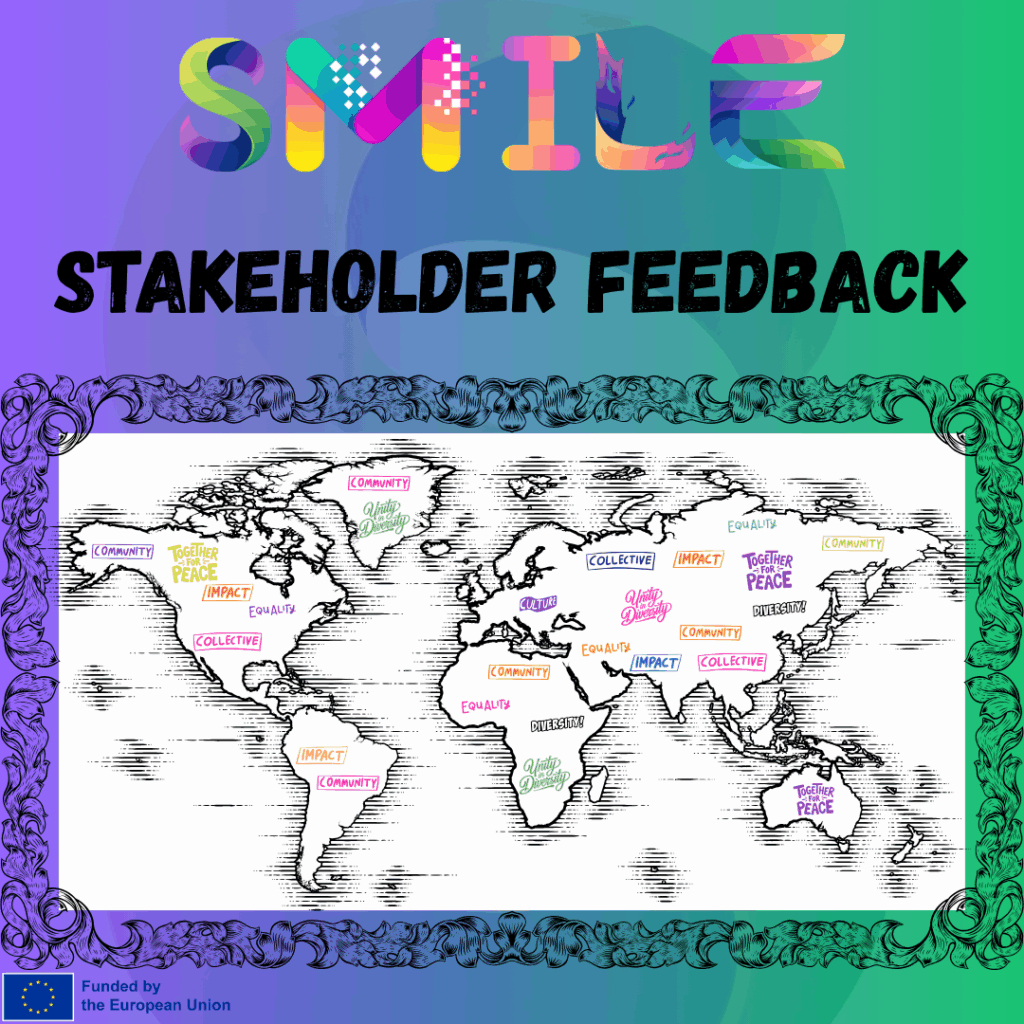
Why These Surveys Matter
These surveys are more than data, they are voices, experiences, and expectations that guide the way SMILE evolves.
Every feature of our tools, from design to privacy settings, from gameplay to emotional content, reflects what stakeholders told us matters most.
Through this ongoing dialogue, SMILE ensures that the solutions we co-create are not only innovative, but trusted, relatable, and human-centered.
SMILE Stakeholders Surveys: Help shape the future of Youth Mental Health
The SMILE project is commited to making a real impact on youth mental health by developing innovative digital tools and fostering collaboration among diverse stakeholders. Your insights and expertise are crucial to ensuring that our solutions are effective, inclusive, and impactful. For this purpose, we have designed two targeted surveys, each focusing on a unique aspect of our project:
- Stakeholder Alignement: Let us know how our project aligns with your interests, goals, and expectations.
- Stakeholder Composition and Contribution: Let us know your expertise and the level of engagement you envision with SMILE.
Thanks to the collaboration between stakeholders — including researchers, educators, healthcare professionals, families, young people, policymakers, and the general public — the SMILE tools and resources are shaped by your input. Together, we are ensuring that the design of SMILE tools is tailored to meet real needs, our co-creation process is guided by diverse perspectives, and our shared efforts create a lasting impact.
To contribute, click on the images below to access the surveys or scan the QR codes to participate in the Survey on Alignement and the Survey on Composition and Contribution.
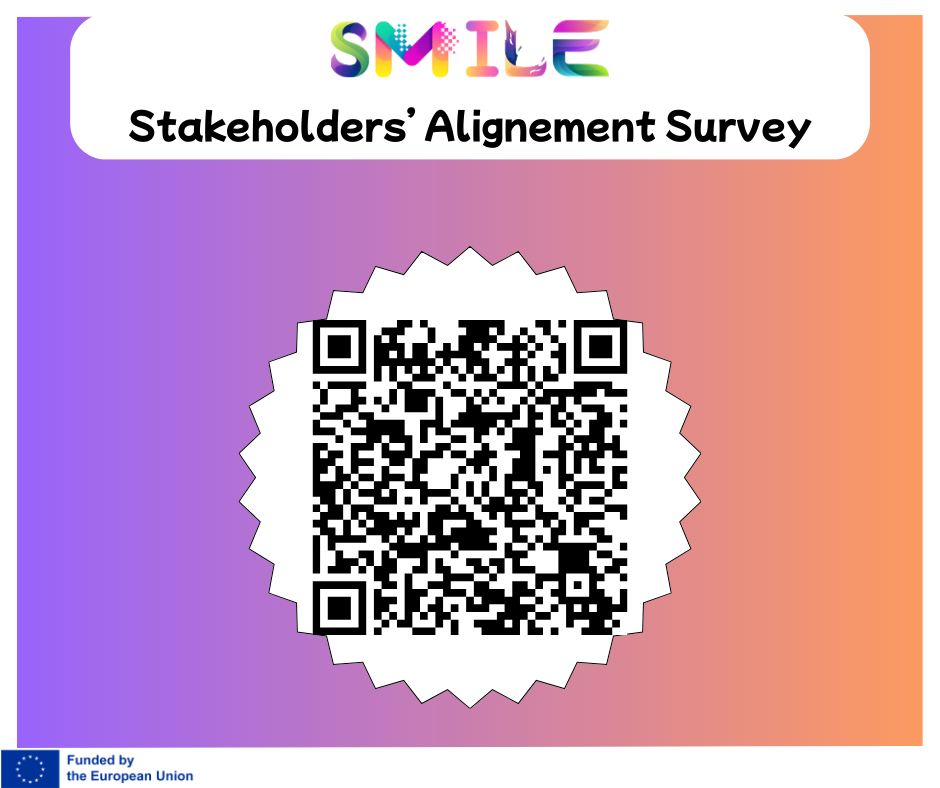
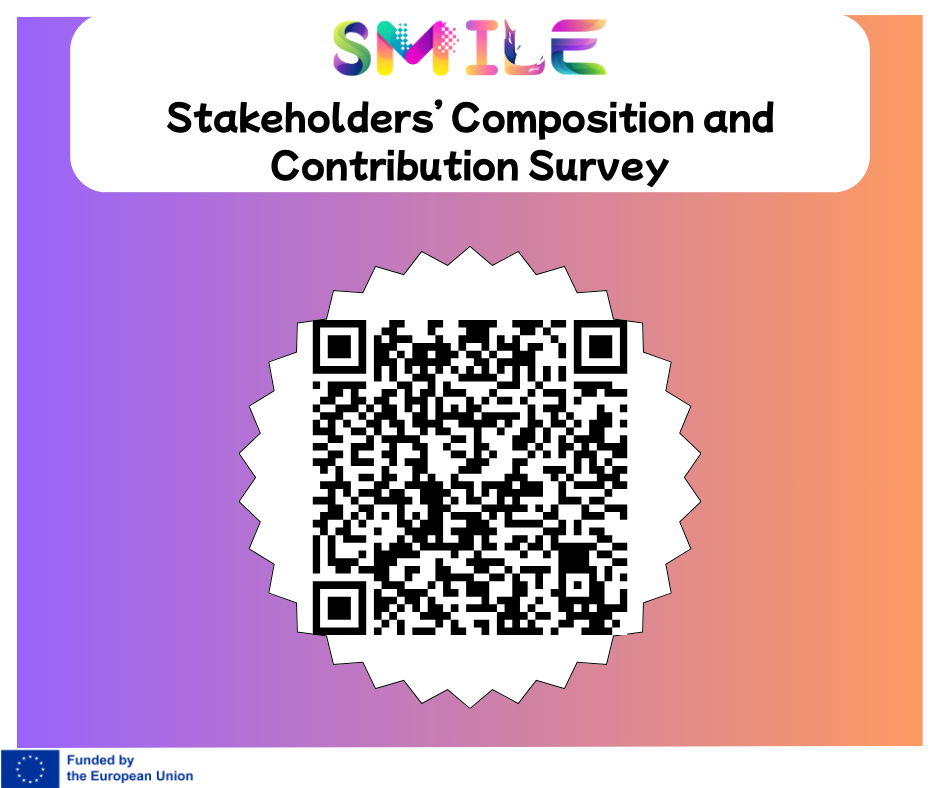
SMILE Living Labs Across Europe: Co-Creation in Action
At SMILE, we believe that the future of youth mental health must be designed with young people, not just for them. That’s why the SMILE project has implemented a co-creation methodology across seven European countries through Living Labs. These Living Labs are not simple user testing sessions, they are real-world innovation spaces where young people aged 10 to 24 collaborate with psychologists, researchers, designers, and educators to co-create inclusive, evidence-based digital tools that genuinely respond to their needs.
SMILE Living Labs are structured participatory workshops held across all seven pilot countries. In each pilot country, up to 300 young people are taking part in a pilot study to evaluate the digital tools and identify barriers and opportunities for wider implementation across Europe. Each session was carefully designed to gather age-appropriate, context-sensitive, and ethically guided insights to refine two flagship digital tools:
- 📱 The Companion Mobile App, a mobile resource offering self-management strategies, daily mental health tips, and accessible crisis support.
- 🎮 The Serious Video Game, an emotionally engaging, interactive experience that builds emotional literacy and resilience through narrative gameplay.
More than feedback sessions, these Labs positioned youth as active contributors to tool design, from visual preferences and user flow to content relevance and emotional impact. Additionnally, some of the Living Labs included broader context encouraging reflection on the digital landscape and expanded their understanding of digital well-being.
What Makes the SMILE Approach Unique?
- Age-Stratified Participation: Workshops were tailored for three age cohorts (10–14, 15–19, 20–24) to match cognitive development, digital behaviours, and emotional maturity.
- Multi-Stakeholder Facilitation: Each lab brought together youth facilitators, mental health professionals, designers, and local educators to ensure multidimensional perspectives.
- Ethical & Inclusive Design: Guided by safeguarding protocols, all sessions centred on respectful, trauma-informed engagement, fostering a safe space for authentic input.
- Cultural Adaptability: Labs were flexibly adapted to reflect local languages, societal contexts, and educational settings across Europe.
- Iterative Development Integration: Youth feedback directly informed ongoing design decisions, refining features, navigation, tone, accessibility, and emotional resonance.
- Creative & Interactive Methods: Sessions included storytelling, gameplay walkthroughs, empathy mapping, card sorting, and collaborative prototyping, empowering diverse expressions.
“This isn’t about usability testing, it’s about shared ownership, trust, and impact. We treat youth as co-designers of their mental health journeys.”
The collective insights from the Living Labs are now feeding into the final development stages of SMILE’s digital tools, influencing our pilot trials and long-term sustainability planning. Through this human-centered approach, we ensure SMILE tools are culturally relevant, psychologically grounded, technically accessible, and emotionally resonant. the SMILE Living Labs embody our core vision: youth-driven, science-based, and socially inclusive mental health innovation for Europe. Several sessions concluded with warm and social activities to foster trust, open dialogue, and a sense of belonging between youth participants and facilitators. These moments help build the psychological safety essential for meaningful co-creation.

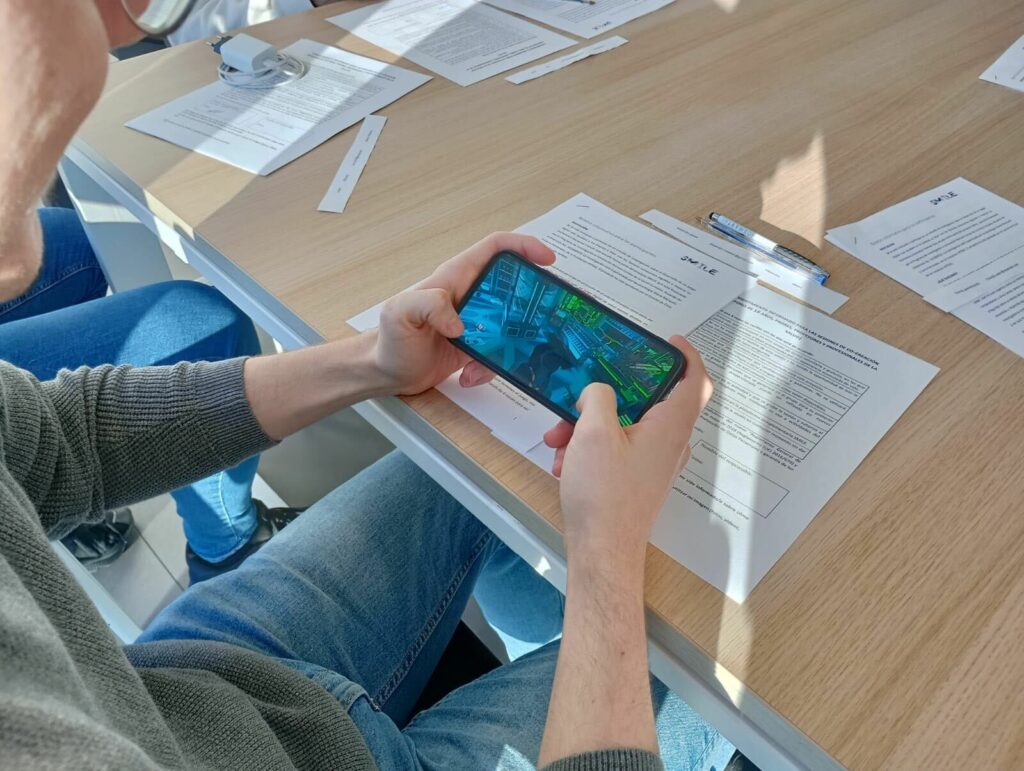
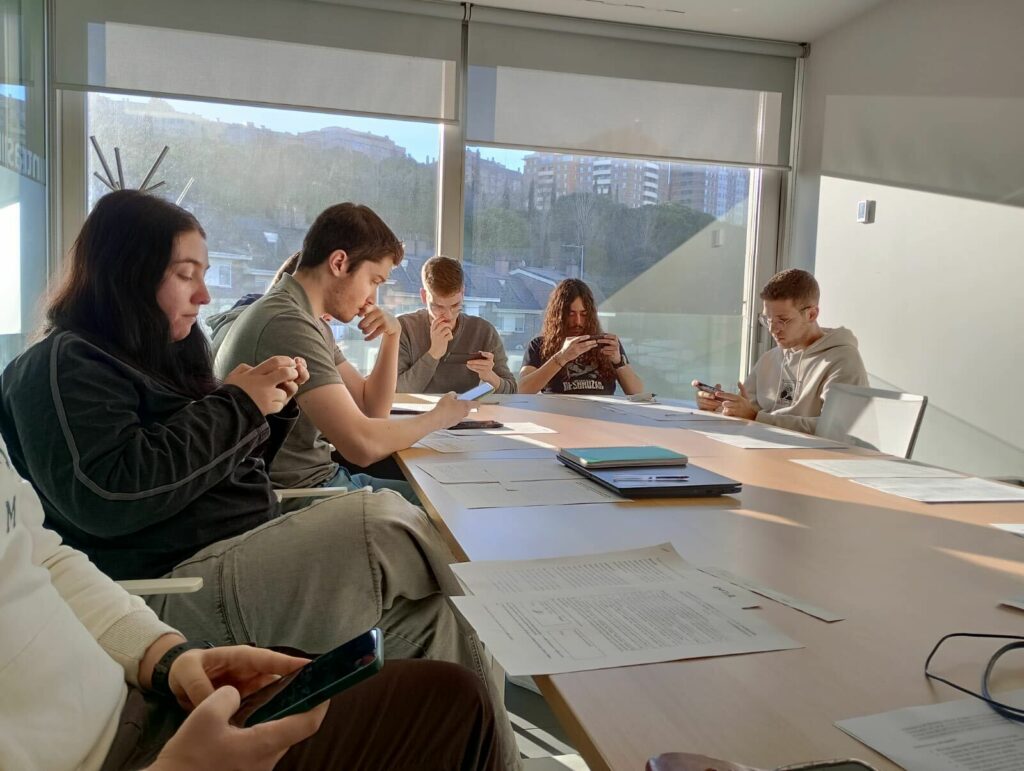
Game On: Co-Creating Future-Ready Mental Health Solutions with Young Minds
Engaging Stakeholders Through SMILE’s Innovative Approach: The ‚Game On‘ Workshop Experience
At the Open Living Labs Days (OLLD) in Timișoara, held from September 25th to 27th, 2024, the SMILE team collaborated with stakeholders in dynamic workshops designed to simulate real-world applications of digital tools, specifically the SMILE Companion App. This event, hosted by the European Network of Living Labs (ENOLL), highlighted SMILE’s commitment to interactive, experiential methodologies that integrate cutting-edge technologies with everyday applications—a cornerstone of the project’s mission.
The workshop featured innovative exercises, including:
- ”In Their Shoes”: Participants adopted persona viewpoints to uncover key insights and empathise with user experiences.
- ”In Their Shoes Results“: Participants provided structured feedback based on each persona’s perspective.
- ”Real-World Testing Journey”: Stakeholders contributed their voices to explore the seven key phases of SMILE’s implementation journey.
These activities offered an invaluable opportunity for user-centered design and interactive stakeholder engagement, equipping the SMILE team with actionable feedback to refine both the Companion App’s features and its broader implementation strategy.
[Download the Full Report HERE]
Summary of First Workshop Exercise – ”In Their Shoes”
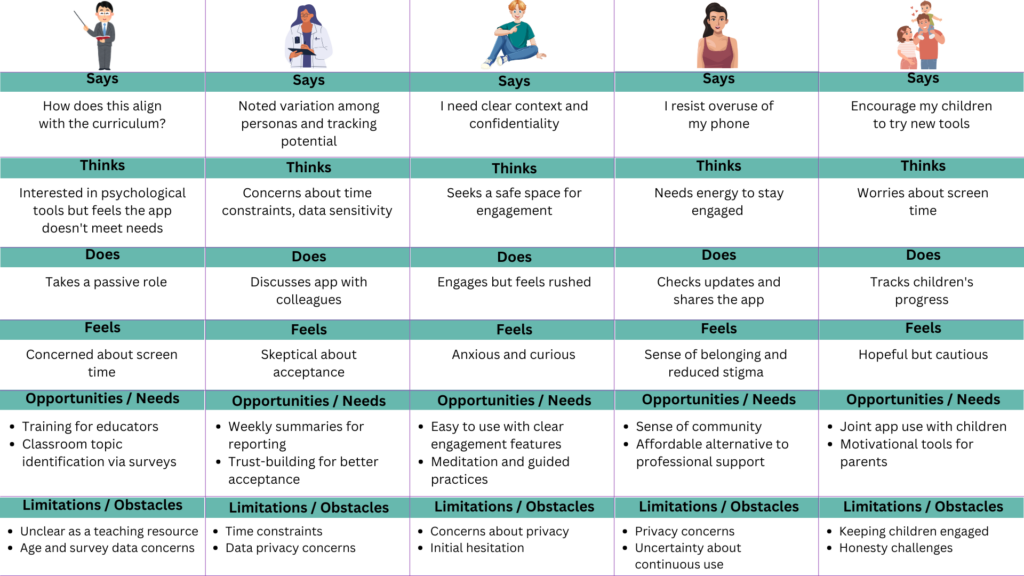
.
Summary of Second Workshop Exercise – ”In Their Shoes Results“
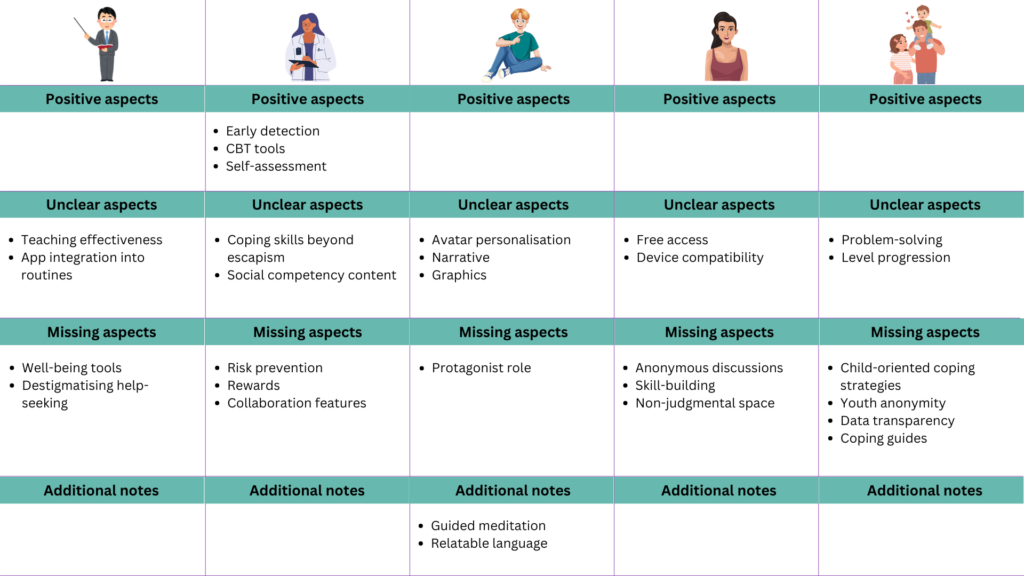
.
Summary of Third Workshop Exercise – ”Real-World Testing Journey”
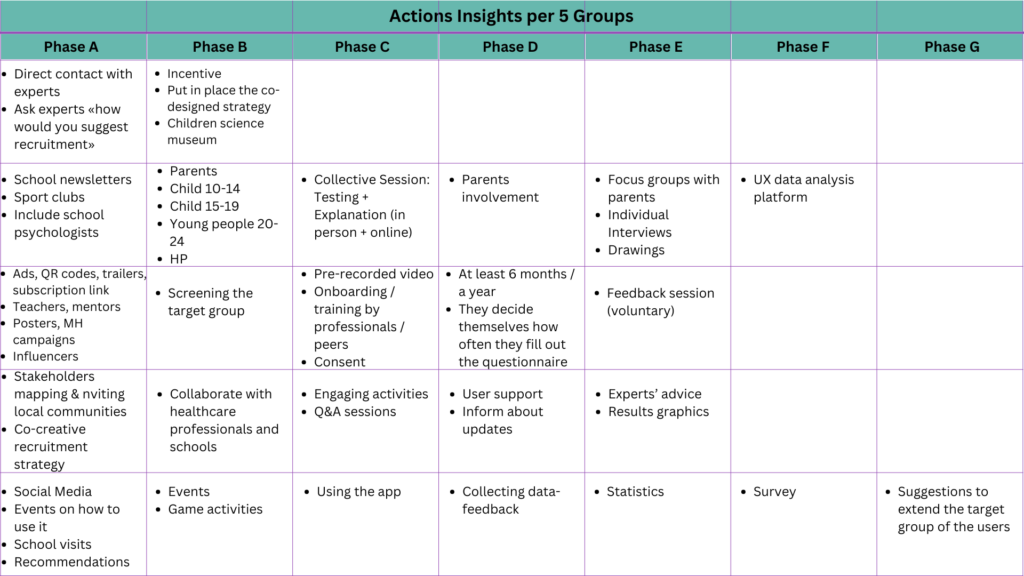
.
